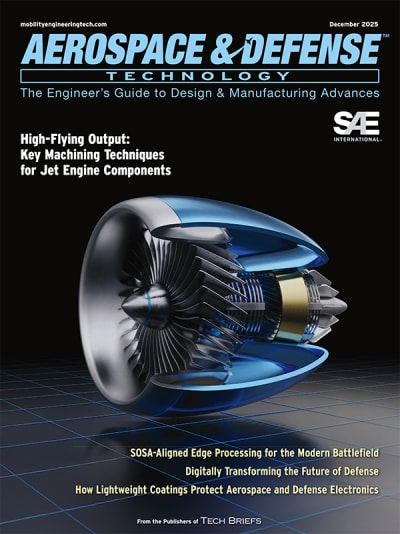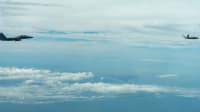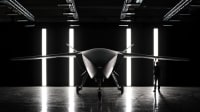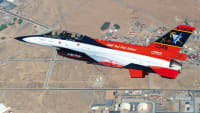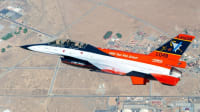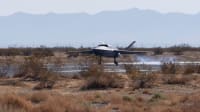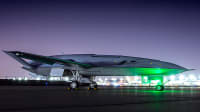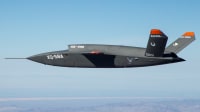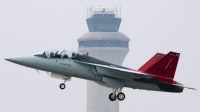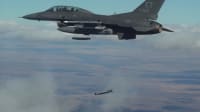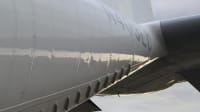AI Algorithms Fly Uncrewed XQ-58A Valkyrie Drone for Three Hour Sortie

Air Force Research Laboratory (AFRL) engineers and researchers used artificial intelligence (AI) agents or algorithms to fly an unmanned XQ-58A Valkyrie aircraft on a three-hour sortie during a July 25 demonstration at Eglin Air Force Base, Florida.
The XQ-58A, developed through an AFRL partnership with Kratos Defense & Security Solutions Inc., is a 30-foot long experimental unmanned aircraft with a range of 3,000 nautical miles designed to act as a "loyal wingman" while controlled and flying in tandem with a manned aircraft. With an operational ceiling of 50,000 feet and a top speed exceeding .9 Mach, Kratos built the aircraft for AFRL's Low-Cost Attritable Aircraft Technology (LCAAT) project portfolio, established to "break the escalating cost trajectory of tactically relevant aircraft and provide an unmanned escort or wingman aircraft alongside a crewed fighter aircraft in combat," according to Kratos.
During the three-hour sortie in July, AFRL used the same AI algorithms that previously demonstrated their ability to pilot the Lockheed Martin-built X-62A during a flight evaluation program held at Edwards Air Force Base in December 2022. The algorithms were developed by AFRL’s Autonomous Air Combat Operations (AACO) team and have matured during millions of hours in high fidelity simulation events, sorties on the X-62 VISTA, hardware-in-the-loop events with the XQ-58A, and ground test operations.
“The mission proved out a multi-layer safety framework on an AI/ML-flown uncrewed aircraft and demonstrated an AI/ML agent solving a tactically relevant “challenge problem” during airborne operations,” said Col. Tucker Hamilton, Chief, AI Test and Operations, for the Department of the Air Force. “This sortie officially enables the ability to develop AI/ML agents that will execute modern air-to-air and air-to-surface skills that are immediately transferrable to other autonomy programs.”
The flight builds upon four years of partnership that began with the Skyborg Vanguard and the Autonomous Aircraft Experimentation (AAx) programs.
“AACO has taken a multi-pronged approach to uncrewed flight testing of machine learning Artificial Intelligence and has met operational experimentation objectives by using a combination of High-performance computing, modeling and simulation, and hardware in the loop testing to train an AI agent to safely fly the XQ-58 uncrewed aircraft,” said AACO Program Manager, Dr. Terry Wilson.
Top Stories
INSIDERRF & Microwave Electronics
![]() FAA to Replace Aging Network of Ground-Based Radars
FAA to Replace Aging Network of Ground-Based Radars
PodcastsDefense
![]() A New Additive Manufacturing Accelerator for the U.S. Navy in Guam
A New Additive Manufacturing Accelerator for the U.S. Navy in Guam
NewsSoftware
![]() Rewriting the Engineer’s Playbook: What OEMs Must Do to Spin the AI Flywheel
Rewriting the Engineer’s Playbook: What OEMs Must Do to Spin the AI Flywheel
Road ReadyPower
![]() 2026 Toyota RAV4 Review: All Hybrid, All the Time
2026 Toyota RAV4 Review: All Hybrid, All the Time
INSIDERDefense
![]() F-22 Pilot Controls Drone With Tablet
F-22 Pilot Controls Drone With Tablet
INSIDERRF & Microwave Electronics
![]() L3Harris Starts Low Rate Production Of New F-16 Viper Shield
L3Harris Starts Low Rate Production Of New F-16 Viper Shield
Webcasts
Energy
![]() Hydrogen Engines Are Heating Up for Heavy Duty
Hydrogen Engines Are Heating Up for Heavy Duty
Energy
![]() SAE Automotive Podcast: Solid-State Batteries
SAE Automotive Podcast: Solid-State Batteries
Power
![]() SAE Automotive Engineering Podcast: Additive Manufacturing
SAE Automotive Engineering Podcast: Additive Manufacturing
Aerospace
![]() A New Approach to Manufacturing Machine Connectivity for the Air Force
A New Approach to Manufacturing Machine Connectivity for the Air Force
Software
![]() Optimizing Production Processes with the Virtual Twin
Optimizing Production Processes with the Virtual Twin

